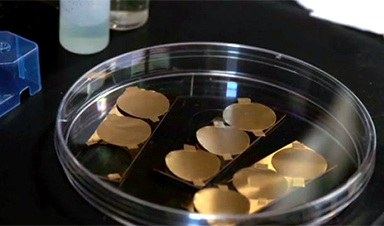Engineers at the University of California San Diego have developed tiny ultrasound-powered robots that can swim through blood, removing harmful bacteria along with the toxins they produce. These proof-of-concept nanorobots could one day offer a safe and efficient way to detoxify and decontaminate biological fluids.
Researchers built the nanorobots by coating gold nanowires with a hybrid of platelet and red blood cell membranes. This hybrid cell membrane coating allows the nanorobots to perform the tasks of two different cells at once — platelets, which bind pathogens like MRSA bacteria (an antibiotic-resistant strain of Staphylococcus aureus), and red blood cells, which absorb and neutralize the toxins produced by these bacteria. The gold body of the nanorobots responds to ultrasound, which gives them the ability to swim around rapidly without chemical fuel. This mobility helps the nanorobots efficiently mix with their targets (bacteria and toxins) in blood and speed up detoxification.
The work, published May 30 in Science Robotics, combines technologies pioneered by Joseph Wang and Liangfang Zhang, professors in the Department of NanoEngineering at the UC San Diego Jacobs School of Engineering. Wang’s team developed the ultrasound-powered nanorobots, and Zhang’s team invented the technology to coat nanoparticles in natural cell membranes.
“By integrating natural cell coatings onto synthetic nanomachines, we can impart new capabilities on tiny robots such as removal of pathogens and toxins from the body and from other matrices,” said Wang. “This is a proof-of-concept platform for diverse therapeutic and biodetoxification applications.”
“The idea is to create multifunctional nanorobots that can perform as many different tasks at once,” said co-first author Berta Esteban-Fernández de Ávila, a postdoctoral scholar in Wang’s research group at UC San Diego. “Combining platelet and red blood cell membranes into each nanorobot coating is synergistic — platelets target bacteria, while red blood cells target and neutralize the toxins those bacteria produce.”
Image Credit: UC San Diego Jacobs School of Engineering
News This Week
Nano-Enhanced Hydrogel Strategies for Cartilage Repair
A recent article in Engineering describes the development of a protein-based nanocomposite hydrogel designed to deliver two therapeutic agents—dexamethasone (Dex) and kartogenin (KGN)—to support cartilage repair. The hydrogel is engineered to modulate immune responses and promote [...]
New Cancer Drug Blocks Tumors Without Debilitating Side Effects
A new drug targets RAS-PI3Kα pathways without harmful side effects. It was developed using high-performance computing and AI. A new cancer drug candidate, developed through a collaboration between Lawrence Livermore National Laboratory (LLNL), BridgeBio Oncology [...]
Scientists Are Pretty Close to Replicating the First Thing That Ever Lived
For 400 million years, a leading hypothesis claims, Earth was an “RNA World,” meaning that life must’ve first replicated from RNA before the arrival of proteins and DNA. Unfortunately, scientists have failed to find [...]
Why ‘Peniaphobia’ Is Exploding Among Young People (And Why We Should Be Concerned)
An insidious illness is taking hold among a growing proportion of young people. Little known to the general public, peniaphobia—the fear of becoming poor—is gaining ground among teens and young adults. Discover the causes [...]
Team finds flawed data in recent study relevant to coronavirus antiviral development
The COVID pandemic illustrated how urgently we need antiviral medications capable of treating coronavirus infections. To aid this effort, researchers quickly homed in on part of SARS-CoV-2's molecular structure known as the NiRAN domain—an [...]
Drug-Coated Neural Implants Reduce Immune Rejection
Summary: A new study shows that coating neural prosthetic implants with the anti-inflammatory drug dexamethasone helps reduce the body’s immune response and scar tissue formation. This strategy enhances the long-term performance and stability of electrodes [...]
Scientists discover cancer-fighting bacteria that ‘soak up’ forever chemicals in the body
A family of healthy bacteria may help 'soak up' toxic forever chemicals in the body, warding off their cancerous effects. Forever chemicals, also known as PFAS (per- and polyfluoroalkyl substances), are toxic chemicals that [...]
Johns Hopkins Researchers Uncover a New Way To Kill Cancer Cells
A new study reveals that blocking ribosomal RNA production rewires cancer cell behavior and could help treat genetically unstable tumors. Researchers at the Johns Hopkins Kimmel Cancer Center and the Department of Radiation Oncology and Molecular [...]














Leave A Comment